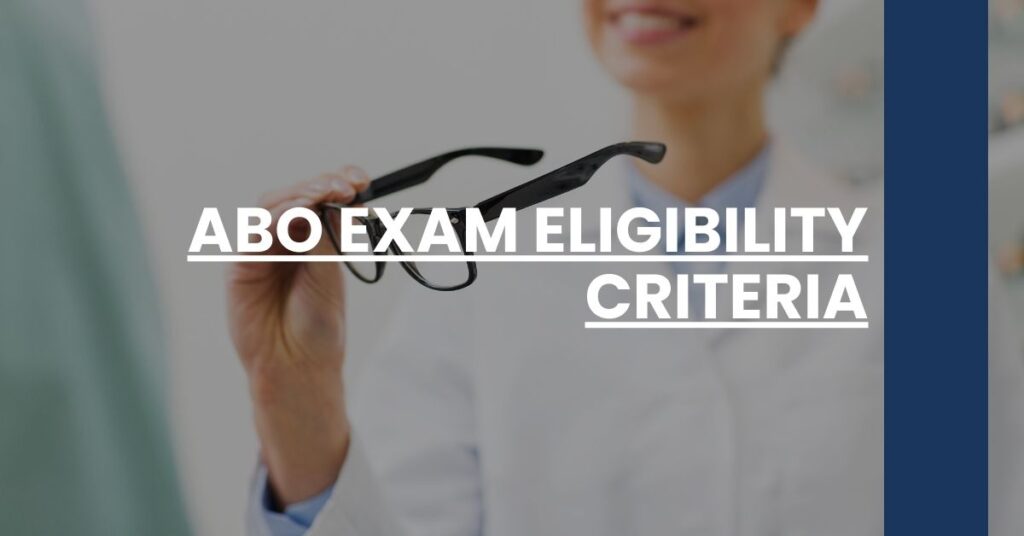Understanding ABO exam eligibility criteria is crucial for opticians aiming to advance their careers.
- Age and Education: Candidates must be 18+ and hold a high school diploma or GED.
- Work Experience: Opticianry work experience can be essential, depending on the state.
- Legal and Ethical Standards: A clean legal history is imperative for ABO exam candidates.
Navigate the ABO exam eligibility criteria seamlessly with this informative guide.
- Understanding the ABO Certification
- Basic Eligibility Requirements for the ABO Exam
- Educational Qualifications
- Work Experience Criteria
- Exemptions and Special Considerations
- Legal and Ethical Standards
- Application and Documentation
- Preparing for the ABO Exam
- State-Specific Requirements
- Continuing Education and Maintaining Certification
- Conclusion and Next Steps
Understanding the ABO Certification
When considering a career as an optician, obtaining your American Board of Opticianry (ABO) certification is a significant milestone. This esteemed credential does more than enhance your resume; it’s a professional declaration of your dedication, expertise, and adherence to the highest standards of patient care. Let’s delve into what achieving ABO certification entails and why it holds such value in the field of optometry.
Why ABO Certification Matters
As a mark of distinction, ABO certification underscores your competencies before employers, colleagues, and most importantly, patients — affording a level of trust and credibility that can only be established through the rigor of ABO’s examination and continuing education requirements. Here’s why it’s essential:
- Professional Recognition: Your ABO certification is not just a piece of paper. It is a testament to your commitment and proficiency, elevating your professional stature in the eyes of peers and the public alike.
- Enhanced Job Prospects: In a competitive job market, your ABO certification is your edge — you’re often preferred for hiring and advancement opportunities.
- Financial Incentives: Certification can unlock the door to higher financial rewards, as many employers recognize the value of an ABO-certified optician with better pay scales.
- National and International Acclaim: An ABO certification knows no borders; it opens up potential career paths both within the United States and abroad. Explore the importance of certification to understand how it can fuel your ambition for global opportunity.
The Benefits of Becoming Certified
- State Licensure Support: In jurisdictions where licensure is required, ABO certification may be integrated within or complement the state’s licensing criteria.
- Recognition of Expertise: Beyond fulfilling regulatory requirements, certification conveys to customers that they are in capable hands. It becomes a signal of trust and expertise that can assuredly elevate the caliber of optical services offered.
- Public Assurances: In environments where opticians are not mandated to be licensed, ABO certification becomes a crucial indicator of an optician’s qualifications and dedication to best practices.
When you aim to reach the pinnacle of your profession, considering the ABO certification isn’t just an option; it becomes a strategic career move to ensure that you are recognized for your knowledge and skills.
Basic Eligibility Requirements for the ABO Exam
Embarking on the journey to certification naturally begins with understanding the ABO exam eligibility criteria. From age to educational prerequisites, it’s vital to know where you stand before you can plan your path forward.
Essential Criteria Breakdown
As you consider your eligibility, remember the following basics:
- Age and Education: You must be at least 18 years old and possess a high school diploma or GED. Sometimes, proof of these criteria might be requested, so have your documentation ready.
- Timing and Pass Rates: The ABO exam doesn’t restrict you to a specific timeframe. It offers year-round testing, giving you the flexibility to schedule your exam when you feel most prepared.
Meeting these eligibility criteria is the first stepping stone toward achieving your certification goal, providing you with the baseline of where to start prepping for the exam.
Educational Qualifications
Prior to taking the ABO exam, a solid foundation in ophthalmology or opticianry is necessary. Whether you’ve completed a formal opticianry program or have engaged in extensive self-study, it’s this educational groundwork that will underpin your exam success.
Accepted Qualifications for Eligibility
- Depth of Knowledge: Expect that a comprehensive understanding of optics, lens materials, frame adjustments, and prescription interpretation will be assessed.
- Accredited Programs: If you’ve completed an education program, ensure it’s recognized by the ABO to be considered valid for the eligibility criteria.
Keep in mind that a critical aspect of your eligibility rests on your educational background. This isn’t merely about taking courses but about assimilating knowledge that will be indispensable as an optician.
Work Experience Criteria
The realm of opticianry is not just learned in classrooms or textbooks but is also greatly influenced by hands-on, practical experience. Active engagement in the field is not only enriching but is a mandatory slice of the ABO exam eligibility criteria.
Accumulating Relevant Experience
Prior work experience or an apprenticeship in opticianry is a valuable credential that the ABO considers when evaluating your readiness to sit for the exam. While details on the exact duration or nature of the required experience are not explicitly stated, here’s what you should consider:
- Working under the tutelage of a certified optician can offer you hands-on skills and real-world insights.
- Documenting your work experience is paramount — maintain precise records of your professional journey as they may be reviewed during your application process.
Exemptions and Special Considerations
The ABO acknowledges that one size doesn’t fit all; thus, there are instances where exemptions or special considerations come into play. Whether it’s alternate pathways or accommodations for unique circumstances, understanding these can help streamline your strategy for meeting the ABO exam eligibility criteria.
Understanding Exemptions
These are the key aspects to remember:
- Alternate Pathways: For internationally trained optometrists or those who have completed non-traditional educational routes, the ABO may offer alternate eligibility criteria.
- Remote Proctoring: Recognizing the need for flexibility, some states, including Arizona and Florida, have approved remote proctoring for taking exams, providing greater access to certification.
Thoroughly explore any exemptions or special considerations that might pertain to you. These could represent strategic advantages or necessary adjustments in your path to ABO certification.
Legal and Ethical Standards
As you prepare to take the ABO exam, the importance of legal and ethical standards in the optical field cannot be overstated. Integrity is paramount, and a candidate’s history and conduct are examined under a discerning lens.
A Clear Legal History: Non-Negotiable
Your legal background must reflect the professional and moral standards expected in optometry. Consider this:
- Background Checks: Prior to certification, a background check may be conducted to ensure you align with the professional standards.
- Disciplinary Action Disclosure: If you have faced any disciplinary actions in your professional career, be prepared to disclose them during your application process.
Upholding Ethical Integrity
Misconduct can disqualify you from becoming certified or cause you to lose your certification. Here are some ethical pillars to uphold:
- Patient Confidentiality: Respect for patient privacy is essential. Confidentiality breaches can lead to serious consequences.
- Fair Practice: Demonstrate fairness and honesty in all professional interactions to maintain a reputation of integrity.
Adhering strictly to these ethical guidelines serves as a steadfast assurance to the public of the optometric community’s commitment to trustworthy and ethically sound practice.
Application and Documentation
The ABO exam application process is systematic and detailed-oriented. From compiling required documents to submit your application, attention to detail is crucial.
Gathering Your Paperwork
Begin by organizing:
- Educational Documents: This includes transcripts, diplomas, or certificates from accredited educational institutions.
- Proof of Work Experience: Detailed records of any apprenticeships or employment in the opticianry field are often necessary.
Submission Nuances
Follow these steps for a seamless submission:
- Application Deadlines: Keep an eye on the application deadline dates to ensure timely submission.
- Application Fees: Be prepared to pay any associated application fees which are typically non-refundable.
An error-free application is a stepping stone for your eligibility, reinforcing the critical need for precise and thorough documentation. Navigate the application process meticulously, as it serves as the preliminary vetting stage of your competence and commitment.
Preparing for the ABO Exam
Preparation is key to conquering the ABO exam. This involves a combination of reviewing course material, practical experience, and perhaps most importantly—knowing what to expect.
Effective Study Strategies
Implement these strategies for optimal preparation:
- Review Past Material: Revisit coursework and materials that cover crucial topics like optics and lensometry.
- Practice Exams: Take advantage of practice tests to familiarize yourself with the structure and style of exam questions.
Leveraging Resources
There are numerous resources available, and utilizing them can bolster your readiness:
- Study Guides: Official ABO study guides can hone your test-taking strategies.
- Peer Study Groups: Collaborate with peers who are also preparing for the certification for collective learning and support.
To be adequately prepared, take a methodical approach to your study regimen, ensuring you are well-versed in opticianry work experience criteria and are practicing with materials reflective of the exam’s rigor.
State-Specific Requirements
Eligibility criteria for the ABO exam can vary based on state-specific regulations. Understanding these nuances is essential as they can significantly influence your exam preparations.
Acknowledging Diverse State Regulations
Each state may have:
- Different Work Experience Requirements: Some states might require additional apprenticeship hours or specific types of on-the-job training.
- Unique Education Criteria: Certain states may demand graduation from an accredited opticianry program.
Before applying, review your state’s opticianry requirements to understand any additional pre-requisites or alternative conditions that may apply.
Continuing Education and Maintaining Certification
Once you secure your ABO certification, the learning doesn’t halt. To maintain your certification and stay relevant in the field, continuing education is indispensable.
Commitment to Ongoing Learning
Continuing education ensures:
- Current Knowledge: Keeping abreast of the latest industry advancements and technology.
- Skill Enhancement: Continuous improvement of skills and techniques.
Accumulating Credits
To maintain your certification, focus on:
- Earning Credits: Required Continuing Education Credits (CECs) must be accumulated within a set timeframe.
- Course Quality: Select courses that are approved and contribute genuinely to your professional growth.
Maintaining certification through Continuing Medical Education (CME) is not simply a regulatory mandate, but also a reflection of your enduring commitment to opticianry excellence.
Conclusion and Next Steps
In mapping out your journey to ABO certification, each step—from verifying your basic eligibility to continued professional development—paves the way towards a pinnacle of success within the opticianry field. The criteria are meticulously crafted to refine and advocate a community of opticians who not only meet but exceed the expectations of the healthcare sector and the communities they serve.
And now, with a comprehensive understanding of the ABO exam eligibility criteria, the ball is in your court. Gather your documents, prepare with conviction, and most of all, hold steadfast to the integrity that the opticianry field reveres. Step forward with confidence, knowing that the lens through which you view your future is clear and focused, with an ABO certification positioned as your crowning professional achievement.

